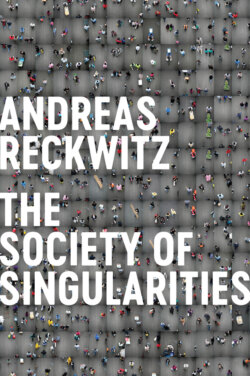Читать книгу Society of Singularities - Andreas Reckwitz - Страница 13
Standardization, Formalization, Generalization
ОглавлениеSince the eighteenth century, the pervasive formal rationalization of modern society has taken place in three areas and approaches. What I have in mind is technical rationalization, cognitive rationalization, and normative rationalization, each of which involves specific practices and different variants of “doing generality.”
Technical rationalization is mainly found in the fields of production, natural processing (industrial agriculture, the extraction of raw materials), the industrial manufacturing of capital and consumer goods, as well as in urban development and the transportation sector.11 It entails reconfiguring behavior and implementing technology in order to increase the efficiency of the production and distribution of goods (as well as that of the behavioral coordination needed to do both). Here the practice of the general is one of standardization: to increase efficiency, it is necessary to standardize, homogenize, and identically reproduce the optimal types of behavior within the human–machine configuration in order to coordinate them according to a predictable pattern. At the same time, these human–machine configurations enable the production of standardized entities, especially identical goods in a seemingly unlimited number.
The locus of cognitive rationalization is the sciences – particularly the natural sciences, but the behavioral sciences as well. Here the practice of the general is one of generalizing knowledge, and its goal is to produce general, empirically tested theories with which to provide generally valid descriptions and explanations of reality, the ultimate aim being to subject reality to technological control. This general knowledge can then be conveyed to subjects within the framework of education. The intention of both technical and cognitive rationalization is to quantify and measure the general entities that they require and produce. For this reason, standardization and generalization are related to the modern ideal of quantification, according to which seemingly everything has to be measured, be it in terms of correlations, growth, or quantities.12
Finally, the normative rationalization of modernity involves the targeted regulation of intersubjective orders, characteristic of which is modern law with its origins in discursive arenas and its use in government administration. In a strict sense, it can have a normative or normalistic form.13 Here the practice of the general is one of formalization. In law, the most general possible rules are established, and entirely deducible systems of rules are put in place in order to guide (and, if necessary, correct) individual acts of social behavior. On the one hand, the intention of modern law is to make activity predictable and transparent; on the other hand, however, it is also meant to convey the conviction of a regulated order in which equal things are treated equally and unequal things are treated unequally. Law, and with it the entire normative rationalization of modernity, which also encompasses non-judicial areas of civilian interaction and moral behavior, is intended to make social interactions predictable and reciprocal. Law and normative rationalization require fundamental legal equality, but they also require the psychological uniformity of subjects, who are expected to be self-responsible and follow norms.
As the three forms in which the rationalistic logic of the general operates and enacts generality, standardization, formalization, and generalization have been interconnected with one another since the end of the eighteenth century, and they have made the modern world what it is. Together they have had several consequences: they have lent relatively high levels of predictability, order, and transparency to the social, thus making it seemingly easier to foresee and plan. This logic goes hand in hand with the interchangeability of subjects, who are the primary bearers of functional roles, so that the functionality of subject positions can be independent of personalities, membership in a given family, or group affiliations. Moreover, the social logic of the general reduces the level of emotional intensity that is integral to the social. It leaves no room for participating in a given practice for its own sake, but rather only as a means to a (further) end – for instance to achieve greater efficiency, establish dominion over nature, or coordinate behavior in a more transparent manner. The reification that arises from the generality of these rules is thus associated with controlling and reducing affect. Here, the mode of social practice is not emotional engagement but rather the emotionally distant following of rules. Even moral rules are to be abided by out of duty and not out of inclination.14 In modernity, the social logic of the general ultimately tends toward the ideal of the universal, toward that which is valid for everyone at all times. Even if this universalism is not achieved everywhere – on account of the restrictions of national states, for instance – it remains the ultimate goal of generalization.15
